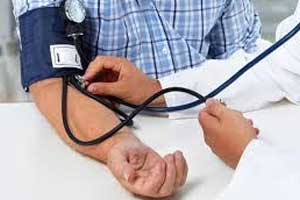- Home
- Editorial
- News
- Practice Guidelines
- Anesthesiology Guidelines
- Cancer Guidelines
- Cardiac Sciences Guidelines
- Critical Care Guidelines
- Dentistry Guidelines
- Dermatology Guidelines
- Diabetes and Endo Guidelines
- Diagnostics Guidelines
- ENT Guidelines
- Featured Practice Guidelines
- Gastroenterology Guidelines
- Geriatrics Guidelines
- Medicine Guidelines
- Nephrology Guidelines
- Neurosciences Guidelines
- Obs and Gynae Guidelines
- Ophthalmology Guidelines
- Orthopaedics Guidelines
- Paediatrics Guidelines
- Psychiatry Guidelines
- Pulmonology Guidelines
- Radiology Guidelines
- Surgery Guidelines
- Urology Guidelines
Sustained high blood pressure linked to Aortic Valve disease

Long-term exposure to elevated blood pressure (BP) is associated with increased risk for aortic valve regurgitation (AR) and aortic stenosis (AS), according to a new study published in the European Heart Journal.
Kazem Rahimi, from the University of Oxford in the United Kingdom, and colleagues tested two related hypotheses that elevated BP is a risk factor for aortic valve stenosis (AS) or regurgitation (AR).
Despite growing prevalence, modifiable causes of aortic valve disease (stenosis or regurgitation) are not well understood, and consequently, there are no effective approaches to its prevention. Given the shared pathways between several cardiovascular conditions, there has been some interest in the assessment of the effect of established cardiovascular risk factors, such as elevated BP, on the risk of aortic valve disease.
For the purpose, the researchers conducted a cohort study involving 5.4 million U.K. patients with no known cardiovascular disease or aortic disease at baseline to examine the correlation between BP and risk for incident AS and AR.
Key Findings:
- 0.38 and 0.12 percent of patients, respectively, were diagnosed with AS and AR over a median follow-up of 9.2 years.
- There was a continuous relationship between systolic BP and the risk for AS and AR, with no evidence of a nadir down to 115 mmHg; for each 20-mmHg increment, the risks for AS and AR increased by 41 and 38 percent, respectively.
- In younger patients, the associations were stronger; no strong evidence was seen for interaction by gender or body mass index.
- The risk for AS increased by 24 percent with each 10-mmHg increment in diastolic BP; there was no change in AR risk.
- Each 15-mmHg increment in pulse pressure correlated with 46 and 53 percent increased risks for AS and AR, respectively.
"These findings suggest that risk of aortic valve disease might be modifiable but further research, ideally from meta-analyses of BP lowering trials or Mendelian randomization studies are needed to assess the causal nature of the observed association," concluded the authors.
For further reference follow the link: https://doi.org/10.1093/eurheartj/ehy486

Disclaimer: This site is primarily intended for healthcare professionals. Any content/information on this website does not replace the advice of medical and/or health professionals and should not be construed as medical/diagnostic advice/endorsement or prescription. Use of this site is subject to our terms of use, privacy policy, advertisement policy. © 2020 Minerva Medical Treatment Pvt Ltd